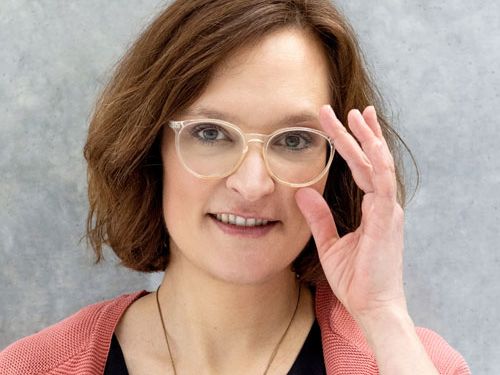An espresso with... Sarah Kumpf

Sarah Kumpf, a Stuttgart native, got her bachelor’s degree in applied literature and cultural studies at the University of Dortmund, minoring in politics and journalism. From 2007 to 2010 she did her master's degree in media culture at the University of Bremen. After spending several years as a journalist at Radio Bremen, she now works at the station as a consultant in the communications department.
Why did you study at the University of Bremen?
My bachelor's degree in Dortmund felt like a relatively unstructured experience, and so then I started to think hard about what I actually wanted to do for my master's degree. Although I didn't want to go further north, I was very interested in Uni Bremen's approach to communication and media studies. Then I went to an information event led by Professor Andreas Hepp. He as a person, but also the focus on students’ own research projects in Bremen, the clear content, the academic environment – we were a small group at the time – all that convinced me. And anyway, I found the city nice. That's how I came to Bremen.
Did you actually do research during your master's degree?
Yes, I had no experience with that at all and found the qualitative approaches in Bremen particularly exciting. We did research on youth scenes with Marco Höhn, a lecturer who unfortunately died much too early. With two fellow students I went to a Jesus Freaks festival in Gotha, very strange but very instructive. At that time,"prestige TV" was a hot topic, those shows really boomed, with "The Wire" and everything that came after. In my master's thesis I did my own small research project on this. It was about transmitting distinction through television and how watching these series became a sign of "good taste”.
Were your expectations of the programme as a whole also met?
Absolutely. We were only about 16 master's students. At the beginning, I was worried that our degree programme was too school-like. But that didn't turn out to be the case. We were a good group and we were very active together. I was able to broaden my horizons and get a more systematic overview of the entire discipline and the field of research, of the different schools of thought and how Andreas Hepp and his team position themselves in that landscape. So I got a good foundation and also really understood what studying can mean.
Marco Höhn was the heart and Andreas Hepp the head of the programme, and together they did an excellent job of bringing in good people, creating good course offerings and encouraging us to do research ourselves.
Also important for me was a practical seminar given by Michael Glöckner, the former press spokesman for Radio Bremen. That was my first contact with the station, which later led to an internship and then to my traineeship.
What did you bring from your studies to your work at Radio Bremen?
In concrete terms, I can't really say. Journalistic basics and journalistic craft, I learned while I was studying in Dortmund. That was very helpful for my application as a trainee and later for my work on Radio Bremen programmes. From the University of Bremen I learned more fundamental things. For example, how to get to the bottom of problems and distil knowledge: where can I find the relevant literature and reliable information, who do I need to network with, how does our media landscape work?
What advice would you give to students today?
I find that very difficult because a lot has changed since my time there. But one thing is still true: don't go straight to university, do something else first! Travel, work, serve as a volunteer…and then many people would say you should study something you enjoy. That's true, but it shouldn't be the only criterion. Before you begin your studies, take the time to think about how you want to live, and what is important to you, and let that influence your decision. For example, if you want a steady income, it might be better not to study "something with media". It doesn't hurt to be more specific and set your sights on something. In the media industry, you have to stay very open to different career paths, to potential contacts, to ideas.
What do you associate with the University of Bremen today?
A university where a lot is going on, things are on the move. Just looking at my old degree programme and seeing how big it’s become, that’s a rapid development. And the fact that the university is to some extent constantly reinventing itself, attracting new people along the way.
On 22 February, you’re moderating our event at Radio Bremen on the future of public service broadcasting (PSB). It's also about the current crisis in the sector. What is it like for you personally, being in a communications department in a consortium (ARD) that is facing such criticism?
It's definitely an exciting, varied and multi-facetted job. At Radio Bremen there aren’t any scandals, but as part of ARD we are currently getting more enquiries about our work – some of them from inside our own house. Because even our own editorial teams are critical and question how Radio Bremen works and is organised. By the way, we’re getting a lot of praise and positive feedback from our audience at events and in conversations about our programming and our productions.
Further information on the event:
The Future of Public Broadcasting - Conversation with Radio Bremen Director Yvette Gerner. (in German)
Radio Bremen visit on Wednesday, February 22, 2023, at 6 pm.

